NSW coronavirus outbreak: Army called in to curb runaway Covid-19
Health officials have been unable to identify the source of almost 800 Covid-19 infections in Sydney’s latest outbreak.
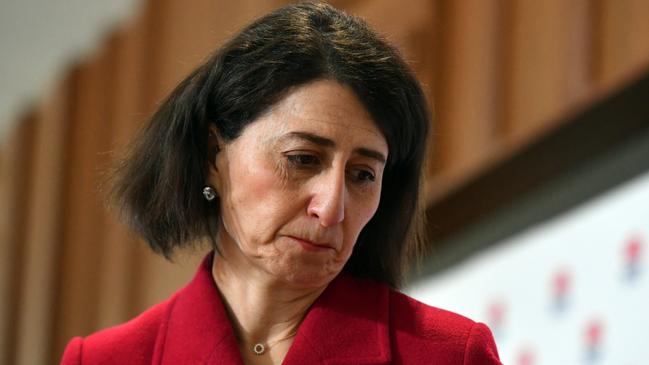
Health officials have been unable to identify the source of almost 800 Covid-19 infections in Sydney’s latest outbreak, as contract tracers struggle to keep pace with the spread of the virus and new cases reach record levels.
After case numbers jumped to 239 on Thursday, up from 177 the day before, NSW Premier Gladys Berejiklian called in the Australian Defence Force to help enforce compliance with lockdown measures and tightened restrictions on the eight worst-affected local government areas.
With the number of people infectious while in the community increasing, official figures show 779 Covid-19 cases remained under investigation late on Thursday, including dozens of infections stretching back a fortnight.
The source of 118 cases recorded in the first two weeks of July remains under investigation.
Among the tighter restrictions imposed by the NSW government on Thursday in the eight hardest-hit areas were mandated mask use outdoors and a 5km travel limit. Fines have been increased, and police given the power to shut non-compliant workplaces.
The rise in cases over the past week has slowed down how quickly patients were notified of their positive test results and delayed interviews by contact tracers.
Just 67 per cent of new cases were interviewed within 24 hours of officials being notified, down from 95 per cent in earlier weeks, separate NSW Health figures for the week ending July 26 show.
The data, disclosed on Thursday, also shows 84 per cent of cases were notified within a day of taking a Covid-19 test, down from 90 per cent a week earlier.
However, 58 per cent of cases were in isolation within one day of their first symptoms, up from 50 per cent a week earlier.
Ms Berejiklian said daily infections were “likely to get worse before they get better” but denied the government had not moved fast enough to contain the virus.
“There is no perfect way to deal with a pandemic and we’ve been far from perfect and I would have made that comment 18 months ago,” Ms Berejiklian said.
The ADF, first offered by the commonwealth on July 7, will send 300 personnel to assist with enforcing compliance.
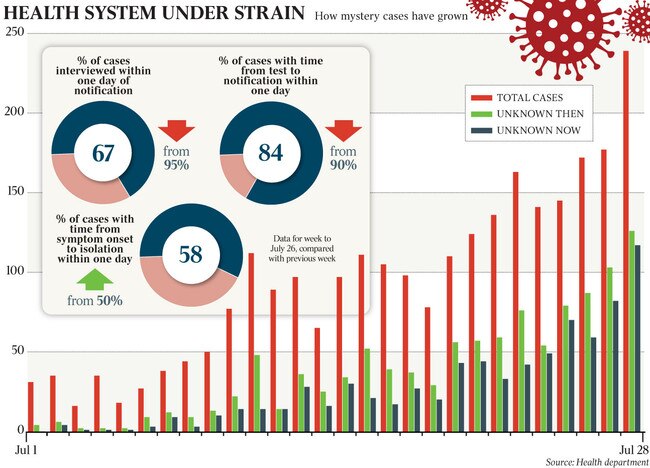
Government sources said the request from NSW was for a six-week deployment, taking their possible presence in Sydney’s suburbs beyond the current lockdown end date of August 28.
NSW officials say this was done for administrative reasons, not because the lockdown could be extended into September as widely expected.
Of the new cases on Thursday, 88 had been in public while infectious. Officials were still investigating whether another 70 cases had been in public or isolating.
There were also two deaths reported: a woman in her 90s and a man in his 80s, both from Sydney’s southwest. Neither had been vaccinated; both were household contacts of known cases.
Fifty of the 54 people with Covid-19 in hospital intensive care units were unvaccinated.
In a statement, NSW Health said it was “unsurprising” that some cases remained unlinked due to the nature of the delta strain of the virus now circulating.
“A link indicates where a case may have acquired the transmission. It is not necessary to identify a link, to identify the exposure venues that a case may have visited while infectious,” it reads.
“NSW Health works to link all cases of Covid-19 to ensure there are no ‘missing’ links in chains of transmission. The spread of the delta virus means that even brief contact between two people wearing masks has resulted in spread.”
The outbreak has also taken a toll on NSW Health staff. There were 916 staff on Covid-19 leave in the fortnight to July 18, up from 225 the previous fortnight, health data shows.
“The Delta strain is a gamechanger,” Ms Berejiklian said.
She urged residents to seek vaccinations as soon as possible. She has previously said the lockdowns would not end until community infections dropped towards zero.
“Not only does vaccination reduce you going to hospital, but it also reduces how infectious you are and how much you convey the virus to others,” Ms Berejiklian said.
Cases requiring intensive care have doubled during the past week – from 23 cases to 56 – while the number of hospitals required to treat patients has increased from six to nine.
Both Ms Berejiklian and Dr Chant have in recent days begun to increase their calls for the public to take up vaccinations as soon as possible, highlighting their availability and distribution through pharmacies and mass vaccination hubs.
While NSW officials have been unwilling to nominate a vaccination threshold that would trigger eased restrictions, University of Sydney modelling has found that even if the state were to achieve a target of 40 per cent coverage by mid-September, the lockdown would need to remain in place. In NSW, 16.9 per cent of adults have had two vaccine doses, according to available statistics provided by the federal government.
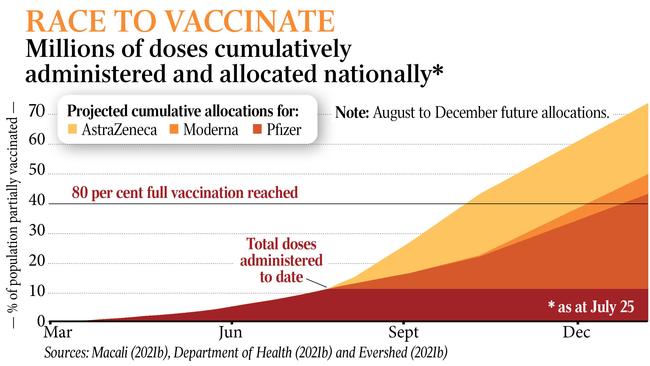
The modelling, which analysed the lockdown between July 16 and July 25, found that social distancing remained at 60 per cent, well below the 80 per cent benchmark for controlling the outbreak of the Delta variant.
“Current social distancing in Greater Sydney is estimated to be up to 60 per cent from 40 per cent a fortnight ago but this is not enough to control delta sufficiently within one month,” the study found.
To reach an 80 per cent target of social distancing, four out of five people would need to drastically reduce their contact with others, and services deemed essential would have to close.
“The accelerating vaccination rollout will begin to make a difference in a few months, but at this stage a tight lockdown makes a larger impact and needs to continue,” said Mikhail Prokopenko, a researcher at the University of Sydney.
“The main takeaways are people should continue to stay at home as much as possible, minimise their interactions outside households, and get vaccinated.”



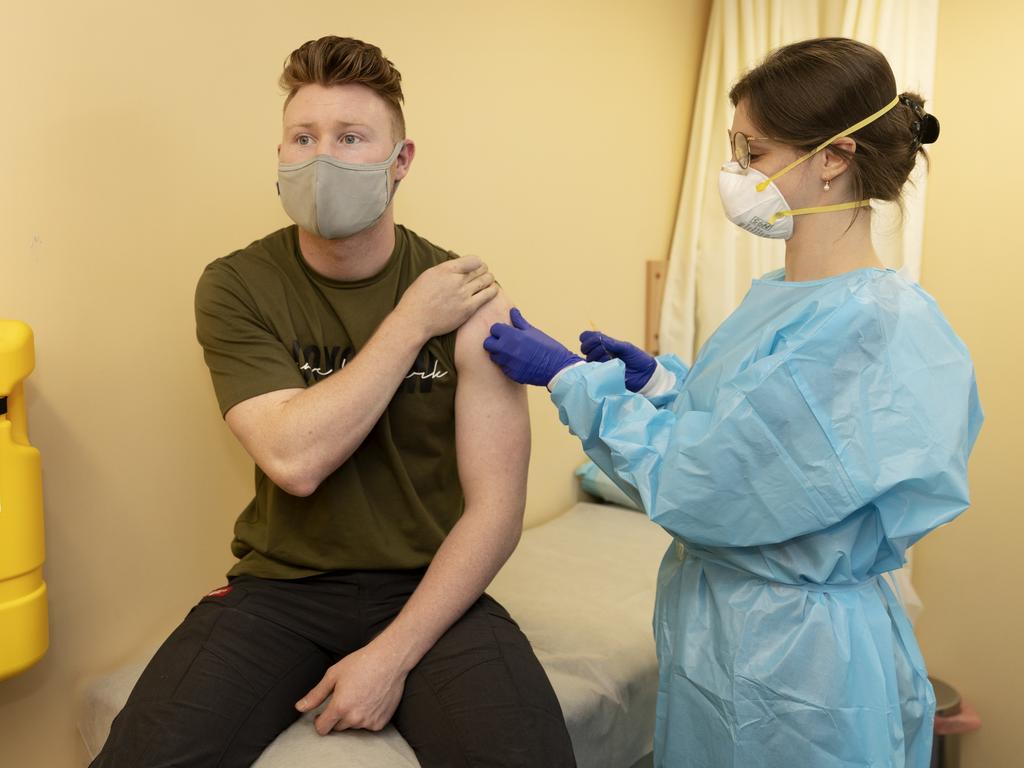

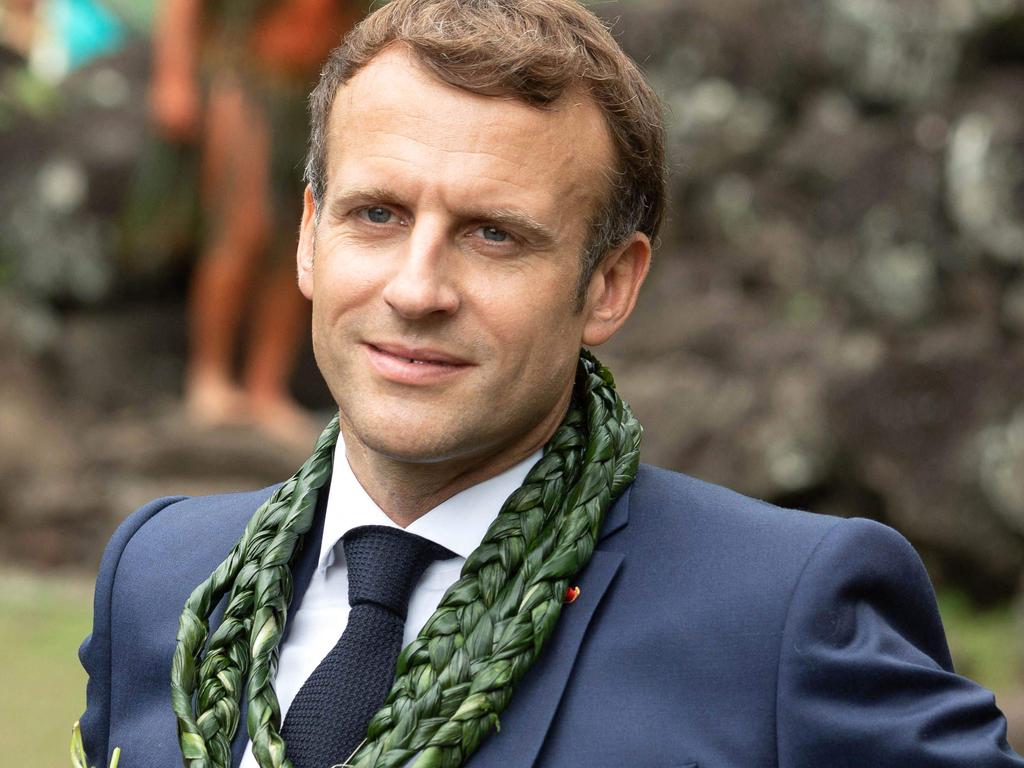


To join the conversation, please log in. Don't have an account? Register
Join the conversation, you are commenting as Logout